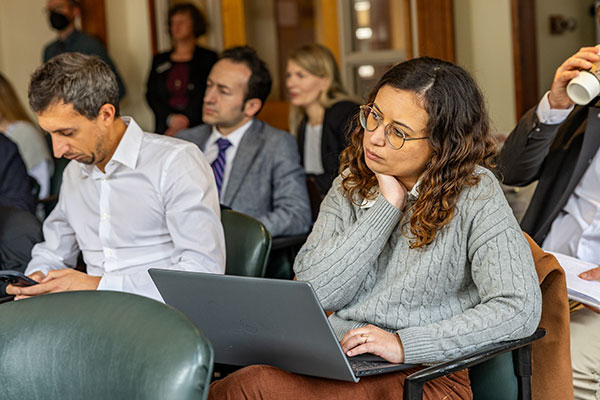‘People Are Exhausted by Politics’: Faculty Assess the 2024 Election at Briefing for International Journalists

Hillygus joined four colleagues Monday for a media briefing with a group of international journalists visiting Duke. The conversation ranged from voting tendencies to young voter turnout, election security, misinformation and other issues.
Voter exhaustion may be particularly acute among young people who see this presidential race as simply more of the same, said Deondra Rose, a public policy professor and director of Duke’s Polis: Center for Politics.
“I’m feeling a little bit of déjà vu this primary season and I think we’re gearing up for an election cycle with voter exhaustion,” Rose said. “They’re seeing the same candidates over and over, so (to get young people interested), it’s about moving past the horse race … and emphasizing the importance of participating in democracy. Self-governance means very little if people don’t participate.”
Judith Kelley, dean of the Sanford School of Public Policy and an international election expert, said this year’s presidential election will be under a microscope.
“This is a really important year and the U.S. election is an important election for the whole world because of the example we set. People will be watching not just who wins the election but how we run the election, how we transfer power, etc.”
Judith Kelley
“This is a really important year and the U.S. election is an important election for the whole world because of the example we set,” Kelley said. “People will be watching not just who wins the election but how we run the election, how we transfer power, etc.”
Kelley said she has been concerned to hear some voters already voicing a distrust of the election process. The day after the election, when skepticism about the integrity of the election could arise, will be a critical moment.
She hopes the people who manage and administer elections learned from the aftermath of the 2020 presidential election, when Trump supporters stormed the U.S. Capitol building on Jan. 6, 2021, while Congress was certifying the election results.

“We do have to be very wary of the post-election hysteria,” Kelley said. “I’m not aware of any guardrails put in place that make me feel great about the situation. But it’s also not obvious to me those guardrails would be widely publicized. I can’t believe there weren’t some strong lessons learned from four years ago.”
Kelley also sounded an alarm about the rampant misinformation that has infected American politics for many years now. The rise of artificial intelligence tools has added a level of nefariousness to the information misdirection American voters have been facing, she said.
Across the country, legitimate news sources have dwindled in number, reach and influence. In their place, bogus and partisan sources masquerading as news outlets have sprung up, spreading disinformation often with the help of popular social media platforms, said Philip Napoli, a public policy professor and director of Duke’s DeWitt Wallace Center for Media & Democracy.
“We see so many communities where basic political information is coming from sources that don’t meet the criteria we associate with journalism,” Napoli said. “We’re just seeing so many of the traditional news sources become a shell of what they once were. We’re seeing the rise of so-called ‘pink slime’ websites that have the trappings of real news but aren’t. The tools to undermine trust are so wide-ranging right now.”
North Carolina is often considered a bellwether state – where election results are indicative of broader national results. North Carolina is a truly purple state, with remarkably close national results from a citizenry now almost equally divided between registered Republicans, Democrats and independents, said Asher Hildebrand, a professor of the practice of public policy at Duke.
“It’s a state that’s politically diverse,” Hildebrand said. “In the last few elections, those voters have tended to deliver split verdicts. Republicans have tended to win federal elections, while Democrats have tended to win the governor’s mansion along with other statewide elections.”
The state offers 16 electoral votes, a significant prize for either candidate. Trump is the likely favorite in North Carolina, Hildebrand said. He won it in 2016 and 2020.